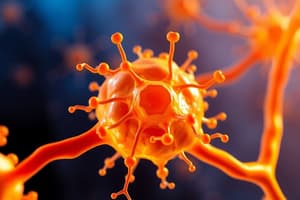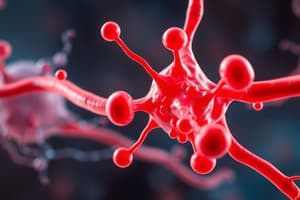Podcast
Questions and Answers
What is the primary function of hormones in the endocrine system?
What is the primary function of hormones in the endocrine system?
- To amplify electrical signals in the body
- To convert nutrients into energy
- To provide structural support for cells
- To act as chemical messengers regulating bodily functions (correct)
Which type of hormone primarily binds to intracellular receptors?
Which type of hormone primarily binds to intracellular receptors?
- Peptide hormones
- Steroid hormones (correct)
- Chemical messengers
- Amine hormones
What is the first step of signal transduction in hormone signaling?
What is the first step of signal transduction in hormone signaling?
- Receptor activation (correct)
- Transduction
- Response
- Signal amplification
Which of the following is a characteristic of negative feedback mechanisms?
Which of the following is a characteristic of negative feedback mechanisms?
What role do second messengers like cyclic AMP (cAMP) play in hormone signaling?
What role do second messengers like cyclic AMP (cAMP) play in hormone signaling?
What is upregulation in the context of hormone receptors?
What is upregulation in the context of hormone receptors?
Which hormone is commonly known for its role in amplifying the stimulus during childbirth?
Which hormone is commonly known for its role in amplifying the stimulus during childbirth?
How do peptide hormones differ from steroid hormones in their receptor interaction?
How do peptide hormones differ from steroid hormones in their receptor interaction?
Flashcards
Endocrine system
Endocrine system
A network of glands that secrete hormones into the bloodstream, regulating bodily functions.
Hormone signal transduction
Hormone signal transduction
The process of a cell changing one signal (hormone) into another, causing a cellular response.
Hormone receptor
Hormone receptor
A protein on or inside a target cell, binding to a specific hormone to trigger a response.
Negative feedback loop
Negative feedback loop
Signup and view all the flashcards
Positive feedback loop
Positive feedback loop
Signup and view all the flashcards
Metabolic regulation
Metabolic regulation
Signup and view all the flashcards
Insulin
Insulin
Signup and view all the flashcards
Glucagon
Glucagon
Signup and view all the flashcards
Thyroid hormones
Thyroid hormones
Signup and view all the flashcards
Peptide Hormone
Peptide Hormone
Signup and view all the flashcards
Signal Transduction Steps
Signal Transduction Steps
Signup and view all the flashcards
Hormone Homeostasis
Hormone Homeostasis
Signup and view all the flashcards
Study Notes
Hormone Pathways and the Endocrine System
- The endocrine system is a network of glands throughout the body that secrete hormones into the bloodstream. Hormones act as chemical messengers, regulating various bodily functions.
- Hormones bind to specific receptors on target cells, initiating a cascade of events that ultimately alter cellular activity.
- Different types of hormones include peptide hormones (e.g., insulin), steroid hormones (e.g., cortisol), and amine hormones (e.g., epinephrine). These diverse structures lead to varying modes of action.
- Endocrine glands and their secretions are interconnected. The release of one hormone can trigger the release of another, creating complex pathways.
Signal Transduction
- Signal transduction is the process by which a cell converts one kind of signal or stimulus into another.
- In hormone signaling, this process involves several steps: reception (hormone binding to a receptor), transduction (a series of intracellular events), and response (cellular changes).
- Receptor activation often initiates a cascade of intracellular signaling molecules, amplifying the initial hormonal signal.
- Various second messengers, such as cyclic AMP (cAMP) and calcium ions, play crucial roles in signal transduction.
Hormone Receptors
- Hormone receptors are proteins located on or inside target cells. These receptors exhibit high specificity for their target hormones.
- Receptor types vary depending on the hormone type. Peptide hormones typically bind to cell membrane receptors, while steroid hormones usually bind to intracellular receptors.
- Receptor activation triggers a specific response inside the cell.
- Hormone receptor interactions can be regulated through various mechanisms such as upregulation (increased receptor number) and downregulation (decreased receptor number) to maintain cellular homeostasis.
Feedback Mechanisms
- Feedback mechanisms are crucial for maintaining homeostasis in hormone regulation.
- Negative feedback loops involve a response that reduces the stimulus. For instance, elevated hormone levels trigger a response that decreases hormone secretion.
- Positive feedback loops involve a response that amplifies the stimulus. An example is the release of oxytocin during childbirth.
- These feedback mechanisms ensure precise and stable concentrations of hormones in the bloodstream.
- Different feedback loops can be involved in the regulation process depending on the hormonal cascade.
Metabolic Regulation
- Hormones play a critical role in regulating metabolism, influencing energy storage, utilization, and expenditure.
- Insulin, glucagon, and epinephrine are key hormones involved in controlling blood glucose levels.
- Insulin promotes glucose uptake and storage, while glucagon stimulates glucose release from the liver.
- The thyroid hormones (T3 and T4) influence basal metabolic rate.
- Other hormones such as growth hormone and cortisol also affect various aspects of metabolism.
- Hormones also influence macronutrient and fat breakdown and storage.
- Specific metabolic pathways are regulated by different hormonal stimuli resulting in specific responses depending on tissue and cell types.
Studying That Suits You
Use AI to generate personalized quizzes and flashcards to suit your learning preferences.
Description
Explore the intricate pathways of hormones within the endocrine system through this quiz. Understand how hormones function as chemical messengers and the importance of signal transduction in cellular responses. Test your knowledge on various hormone types and their actions.




